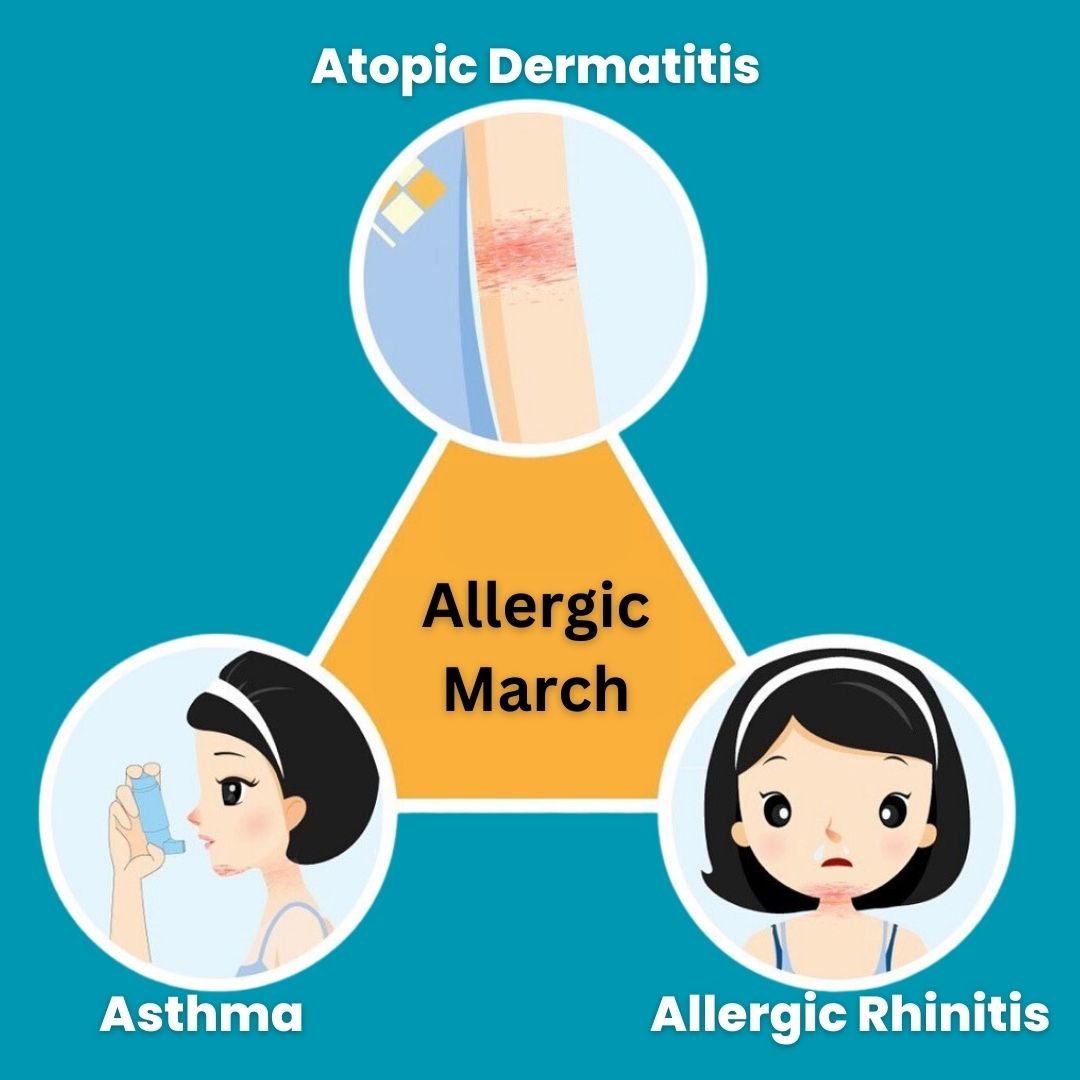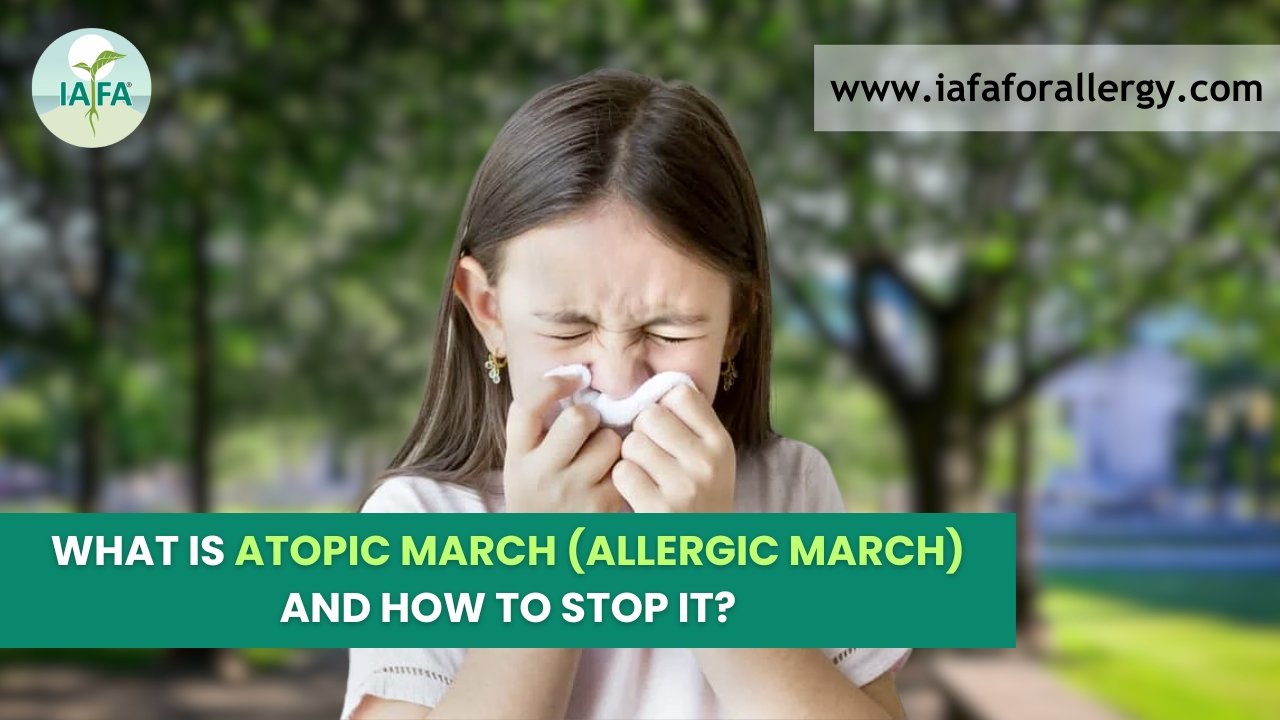What is Atopic March (Allergic March)?
The “Atopic march” refers to the natural progression of allergic diseases that tend to develop in a specific sequence in some individuals who have a genetic predisposition to allergies. It is usually described as a children’s disease because it is more noticeable in paediatric patients. Allergic March Treatment considers the elimination of the root cause of the disease.
The Disease Progresses in the Following Sequence:-
What are the Different Stages of Atopic March (Allergic March)?
Allergy March or Atopic March can be defined in three progressions, but we have to remember a thing here: not everyone with Eczema progresses to other stages of the disease.
The following are the three stages of the disease and Allergic March Treatment involves the treatment of all the three stages of the disease.

Atopic Dermatitis (Eczema)
Atopic dermatitis, commonly known as eczema, often appears in infancy or early childhood. It is characterised by itchy, inflamed skin and is considered one of the earliest signs of an atopic predisposition. Children with eczema may be at an increased risk of developing other allergic conditions later in life.
Allergic Rhinitis (Hay Fever)
Allergic rhinitis, often referred to as hay fever, typically emerges in childhood or adolescence. It involves symptoms like sneezing, runny or stuffy nose, and itchy eyes, and throat. Allergic rhinitis is often triggered by environmental allergens like pollen, dust mites, or pet dander.
Asthma
Asthma may develop in some individuals with a history of eczema, food allergies, or allergic rhinitis. It is a respiratory condition characterised by inflammation and narrowing of the airways, leading to symptoms like coughing, wheezing, and shortness of breath.
Role of Food Intolerance in Allergy March
Food intolerance plays a key role in the development of allergy March. It’s a transient stage of Atopic March. If a patient is intolerant to any food, the food doesn’t get digested properly and undigested food acts as a toxin in the body which causes inflammation in the body. Firstly, it starts as Atopic dermatitis, then it will progress into Allergic rhinitis and Asthma if not treated properly.
What is Atopic March (Allergic March) – As Per Ayurveda?
Ayurveda describes allergies based on the imbalance of three doshas and the immune system. As per Ayurveda, Atopic March (Allergic March) is due to the weak digestive fire known as Agnimandya and to Stop Allergic March, one has to focus on the elimination of the root cause of the disease.
What are the Causes of Atopic March (Allergic March)?
Atopic March is caused due to the following reasons:-
- Certain foods like dairy, meat, nuts and more.
- Irritants such as soaps, washing detergents and more.
- Environmental factors or allergens include cold and dry weather, dampness and more.
- Other allergens include house dust mites, pet dander, pollen and moulds.
What are the Causes of Atopic March (Allergic March) – As Per Ayurveda?
Ayurveda considers an imbalance in doshas can be the culprit for Atopic March symptoms but the other reasons can be the following Atopic March Treatment involves treating these underlying causes.
- Skin barrier defect.
- Compromised Immune system.
- Exaggerated response of T-cells to the allergens and other microbes.
- Intolerance to foods like cows’ milk, eggs, peanuts etc,
- Certain bacterial and viral infections.
- Physical and emotional Stress.
- Weather changes.
What are the Symptoms of Atopic March (Allergic March) – As Per Ayurveda?
Atopic Dermatitis
Symptoms of atopic dermatitis include:-
- Rashes
- Redness
- Bumps
- Itchy skin
- Oozing from the rashes
- Dryness of the skin
- Loss of retention of moisture.
Allergic Rhinitis
The common symptoms of allergic rhinitis include:-
- Continuous sneezing
- Watery eyes
- Runny nose
- Itchy nose and throat
- Nasal congestion
- Sore throat
- Coughing
- Clogged ears
- Reduced sense of smell
Asthma
The following are the symptoms of Asthma:-
- Difficulty breathing
- Chest pain
- Cough
- Wheezing
- Fast breathing
- Shortness of breath at night
- Rapid breathing
- Frequent respiratory infections.
What is the Treatment of Atopic March (Allergic March)? – As Per Ayurveda
Ayurveda offers the root cause treatment of the disease through the use of herbs, classical medicines, IAFA’s personalised external and internal medications and certain Ayurvedic procedures like Panchakarma. Let’s discuss them one by one thoroughly.
Herbs to Treat Atopic March (Allergic March)
- Yashtimadhu
- Karanj
- Sirisha
- Darvi
- Aragwadha
- Bhoomi Amla
- Choti Dudhi
- Shrifal
These herbs are the best for triple action and help Stop Allergic March. They help in fighting infections, boosting immunity, and balancing doshas. One can consume these herbs as such or can be taken in the form of herbal medicines Containing them as formulations.
Classical Medicines for Atopic March
The following are the classical medicines:-
- Sheetpitta Bhanjan Ras
- Haridrakhandam
- Gojihvadi kashayam
- Kushmanda Avaleha
- Agastya Haritaki Avaleha
How Does IAFA Ayurveda Help in the Treatment of Atopic March (Allergic March)?
IAFA Ayurveda offers the best Ayurvedic treatment for Atopic March (Allergic March) by prescribing both internal and external medications, personalised diet and lifestyle modifications and Stop Allergic March. IAFA Ayurveda is the leading institution in the treatment of a wide range of allergies from all around the world. Now IAFA Ayurveda has made it easy for you, it offers online consultation and you can book yours from your home without even stepping out of your comfort zone. The hassle-free online appointments would be scheduled for you with Dr Sahil Gupta who’s a renowned ayurvedic allergy specialist and has successfully treated more than 50000+ patients worldwide. So, book your online consultation now and live a life free from allergies.
Internal Medicine
Internal medications are given for the elimination of the underlying root cause of the disease and to strengthen the body from the inside. The following are the internal medications used in the Ayurvedic medicines to Stop Allergic March.
1. Bhoomi Amla Swaras:- It is useful for skin allergies and burning sensations in the body. It is recommended to take around 15-30 ml of Bhoomi amla swaras daily for the best results.
2. Aahar Amrutham Swaras:- Ayurveda believes that all skin diseases start in the gut, if the gut is toxic with wastes, that’s where the skin allergic reactions would arise. Aahar Amrutham Swaras are useful in gastrointestinal repair and care.
3. Haridrakhandam churna:- It is one of the Ayurvedic classical medicines which contains turmeric as the main ingredient and is widely used for the treatment of various skin and nasal allergies as it can boost immunity and strengthen the body from the inside helping to fight infections.
4. Anthra Mithram Gulika:- Anthra Mithram Gulika is a miraculous medicine for the Allergic March Treatment. It is beneficial for gastrointestinal repair, maintains the digestive system wellness and increases the absorption surface of the gut.
5. Choti Dudhi Swaras:- It supports a healthy digestive system and helps with gastrointestinal motility. It is also useful in clearing respiratory tract toxins.
6. Respiro detox formula:- Respiro detox formula helps in the balance of vata and kapha dosha thereby improving the respiratory tract wellness and boosting the immune system.
7. Respiratory detox tablets:- These tablets help in the reduction of Prana Vaha Srotas ati Pravruti. So they reduce nasal allergy reactions thereby improving respiratory wellness.
8. Shishu Laxoherb:- In the case of children, it helps to reduce Anna-Rasa-Udaka Vaha Srotas Ati Pravruti as it is infused with gut wellness herbs and supports healthy intestinal balance.
External Medicines
The following are the external medications to be given along with the internal medicines for the permanent cure of the disease and to Stop Allergic March.
1. Nasa Yoga Grutham:- Nasa Yoga Grutham is a part of Nasya Karma which is highly beneficial in the treatment of allergic rhinitis. It is recommended to use Nasa Yoga Ghrutham every day in the nasal and naval area to provide an external barrier from environmental triggers.
2. IAFA E-5 Cell Repair Oil:- IAFA E-5 Cell Repair Oil along with extra virgin coconut oil helps in the protection of the skin barrier, helps in skin cell repair, dryness and cracks. It can be used daily to provide nourishment for the skin.
Dietary Changes to Treat Atopic March
As per Ayurveda, the diet which is Satmaya to the body is highly recommended for quick relief from the symptoms of Allergy March and to Stop Allergic March.
1. Bitter and Astringent Foods:- Emphasise bitter and astringent tastes, which can help reduce inflammation. Foods like leafy greens, bitter gourds, and pomegranates fall into this category.
2. Avoid Spicy Foods:- Steer clear of overly spicy and hot foods like chilli peppers, as they can aggravate Pitta.
3. Soothing Herbs and Spices:- Incorporate cooling herbs and spices like coriander, cumin, and fennel into your dishes.
4. Hydration:- Stay well-hydrated with cool, room-temperature water. Avoid excessively cold or ice-cold beverages.
5. Lean Proteins:- Opt for lean protein sources like white meat poultry, tofu, and lentils over heavy and fatty meats.
6. Avoid Alcohol and Caffeine:- Both alcohol and caffeine can be stimulating and aggravate Pitta, so it’s best to limit or avoid them.
7. Favour Whole Grains:- Choose whole grains like basmati rice, quinoa, and barley over refined grains.
8. Cooked vs. Raw:- Cooked foods are generally easier to digest and may be more suitable for Pitta types, but you can include some raw foods in moderation.
9. Regular Meal Times:- Stick to regular meal times and avoid skipping meals to maintain balance.
Lifestyle Modifications to Treat Atopic March
There are certain lifestyle habits you need to adopt and useful in Atopic March Treatment:
1. Close Windows and Use Air Purifiers:- Keep windows and doors closed during high pollen seasons. Use air purifiers with HEPA filters in your home to reduce indoor allergens.
2. Frequent Cleaning:- Regularly clean your home to remove dust, pet dander, and other allergens. Vacuum with a HEPA filter and wash bedding and curtains frequently.
3. Use Allergy-Friendly Bedding:- Consider using hypoallergenic pillowcases and mattress covers to reduce exposure to dust mites.
4. Pets:- If you have pets, bathe and groom them regularly to reduce the amount of pet dander in your home. Create pet-free zones within your house.
5. Nasal Irrigation:- Use a saline nasal rinse to flush out allergens from your nasal passages.
6. Stay Hydrated:- Drinking plenty of water can help thin mucus and reduce congestion.
7. Manage Stress:- Stress can exacerbate allergy symptoms. Consider stress-reduction techniques like yoga, meditation, or deep breathing exercises.
A Quick Wrap-Up
Atopic March or Allergy March is an allergic reaction of the body to the trigger factors or allergens. There are three stages of progression of the disease. The first stage is “Atopic Dermatitis”, followed by ” Allergic Rhinitis” and finally “Asthma.” In some people, we can find only one stage but in some the condition may progress to other stages as well and the symptoms are dependent on the stage of the disease.
Ayurveda says that an imbalance in doshas, altered or compromised immune response and the inability to fight the infections can be the major reasons behind the disease. To treat the underlying root cause of the disease, IAFA Ayurveda provides a holistic approach to the elimination of the root cause of the disease.
IAFA Ayurveda provides hassle-free online consultations to patients from all around. Book your online consultation now with Dr. Sahil Gupta who has around 15+ years of expertise in treating a wide range of allergies by using miraculous ancient Ayurvedic medicine.








